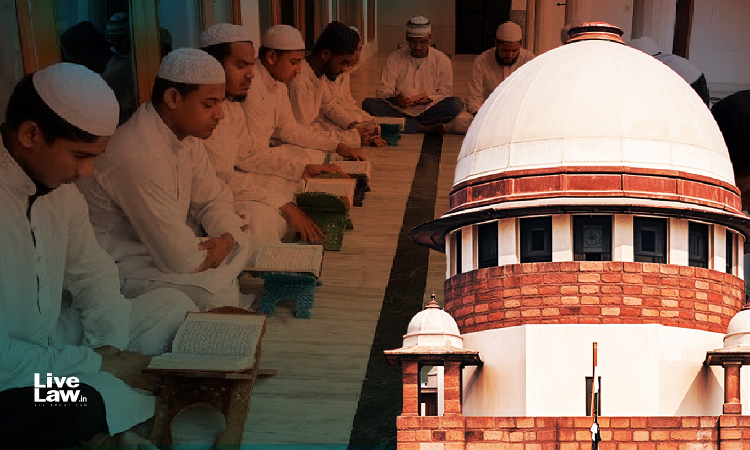- Home
- /
- Top Stories
- /
- Supreme Court Tells Jamiat...
Supreme Court Tells Jamiat Ulema-i-Hind To Approach HC Against NCPCR Letters To Close Madarsas
Amisha Shrivastava
4 Aug 2025 7:25 PM IST
The Supreme Court on Monday continued interim protection granted against communications issued by the National Commission for Protection of Child Rights (NCPCR) directing withdrawal of recognition of Madrasas not compliant with the Right to Education Act, 2009.The Court also suggested that the petitioner may consider approaching the jurisdictional High Court.The Court recorded in its order:...
The Supreme Court on Monday continued interim protection granted against communications issued by the National Commission for Protection of Child Rights (NCPCR) directing withdrawal of recognition of Madrasas not compliant with the Right to Education Act, 2009.
The Court also suggested that the petitioner may consider approaching the jurisdictional High Court.
The Court recorded in its order: “We put it to the learned senior counsel for the petitioner that approach can be made to the High Court with sufficient interim protection. Let her take instructions. List after three weeks.”
A bench of Justice MM Sundresh and Justice N. Kotiswar Singh was hearing a writ petition filed by Jamiat Ulema-I-Hind, which challenges the NCPCR's June 2024 directions to States and the Union Government to derecognise Madrasas that do not comply with the RTE Act and to conduct inspections of such institutions.
During the hearing, Advocate Siddharth Sangal, appearing for the State of Uttarakhand, submitted that the Court had already expressed the view that the matter could be taken to the High Courts instead.
Senior Advocate Indira Jaising, appearing for the petitioner, submitted that the matter requires a full hearing. She pointed out that there was already a stay order passed by a three-judge bench. She said she was prepared to argue the matter as soon as the respondents, i.e., NCPCR, Union of India, and all states and union territories, filed their replies.
However, Justice Sundresh observed that the Court was not inclined to go into the merits of the case. He remarked that since interim protection had already been granted, the petitioner could be permitted to approach the High Court.
“What we can do in this, subject to hearing you, there is already protection you have got. We will extend the protection and we will let you approach the High Court,” Justice Sundresh said.
Jaising sought one week's time to consider the Court's suggestion and take instructions.
Background
The Court had on October 21, 2024, passed an interim order restraining the Union Government and the States from acting upon the communications issued by the NCPCR and the consequent communications by various State authorities. That order was passed by a bench of Chief Justice D.Y. Chandrachud, Justice J.B. Pardiwala and Justice Manoj Misra.
The NCPCR's first communication, dated June 7, 2024, was addressed to the Chief Secretary of Uttar Pradesh, directing withdrawal of recognition of Madrasas not complying with the RTE Act.
On June 25, 2024, the NCPCR asked the Ministry of Education to instruct all States and Union Territories to inspect Madrasas with UDISE codes, withdraw recognition from non-compliant institutions, and to stop extending the UDISE system to Madrasas. It recommended that a separate UDISE category be created to capture information about recognised, unrecognised, and unmapped Madrasas.
Following this, the Uttar Pradesh Chief Secretary on June 26, 2024, asked all District Collectors to investigate government-aided or recognised Madrasas admitting non-Muslim children and to ensure their immediate admission in schools.
The Tripura Government issued similar directions on August 28, 2024. On July 10, 2024, the Union Government also asked all States and Union Territories to act on NCPCR's instructions.
The petitioner has challenged these actions as infringing the rights of religious minorities under Article 30 of the Constitution. While issuing notice, the Court had restrained the authorities from acting on the communications dated June 7, June 25, June 26, July 10 and August 28, 2024.
On the previous date, the Court had expressed a view that parties aggrieved by the impugned communications could approach their respective High Courts
Case no. – W.P.(C) No. 660/2024
Case Title – Jamiat Ulema I Hind v. National Commission for Protection of Child Rights and Ors.



